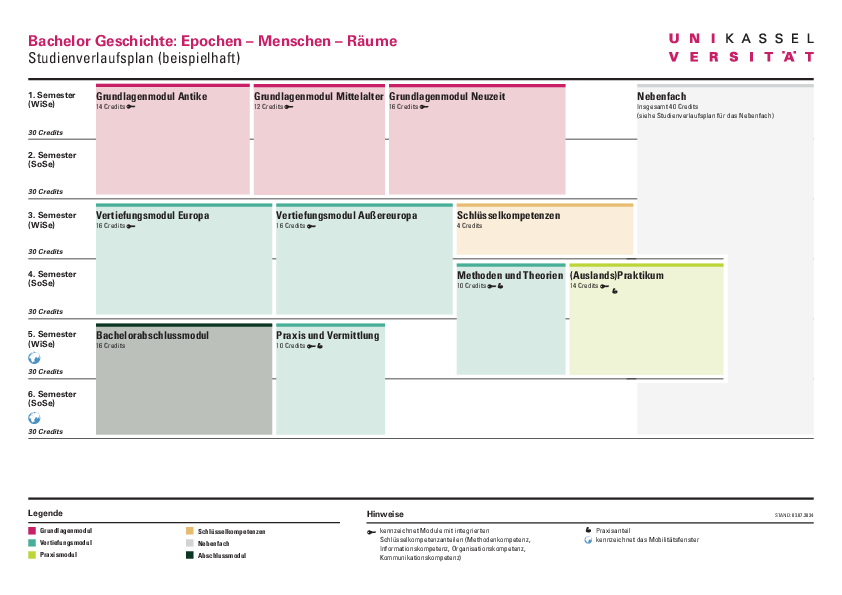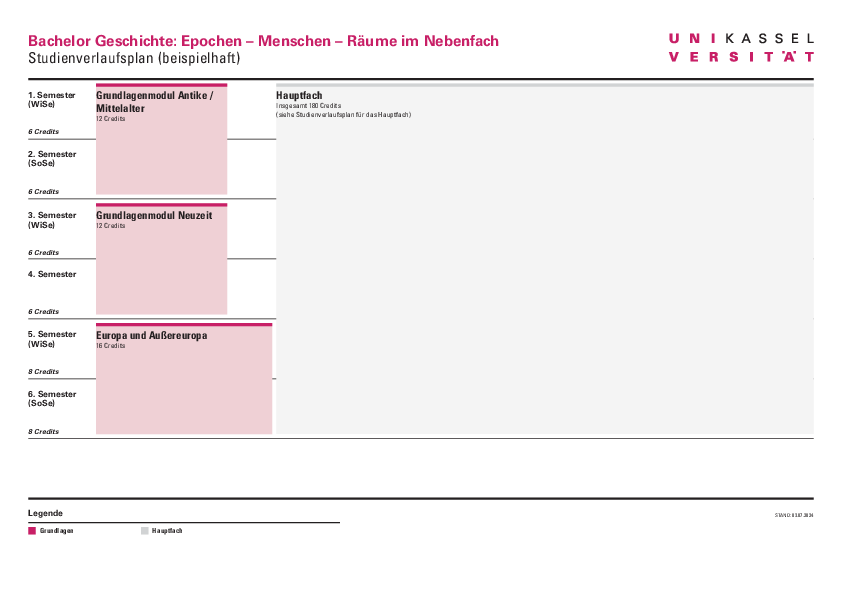How is the course structured?
This page contains automatically translated content.
In the foundation modules, you will be familiarized with the most important epoch-specific reference works and collections of sources. Using specialist academic literature, you will become familiar with the main features of different forms and theories of historiography, such as structural and cultural history. In the application-oriented components of the module, you will practise the independent reproduction and correct citation of academic literature and historical sources and target-oriented bibliography. This will enable you to develop a historical question and to evaluate and critically question sources and literature with regard to this question.
Information on current courses in the foundation modules:
In Module 4, you will deepen your knowledge of European history. Using selected topics, you will learn to classify and explain complex cultural contexts from a historical perspective. Based on an intensive examination of sources and research literature, you will learn to grasp larger spatial dependencies and relationships that characterize the various cultures and societies within Europe in pre-modern and modern times. In this module, you have the opportunity to set priorities and concentrate on epochal or spatial issues. However, you are also free to deepen your study of European history by choosing a broad range of topics.
In Module 5, you will gain an in-depth insight into non-European history and global-historical interdependencies by examining sources and research literature on the basis of exemplary topics. You will also learn to understand larger spatial contexts that characterize the different cultures and societies of the Americas, Africa and Asia. In this module, as in Module 4, you have the opportunity to set priorities and concentrate on epochal, spatial, transfer-historical or global-historical perspectives. However, you are also free to deepen your study of non-European history by choosing a broad range of topics.
In Module 6, you will deepen your knowledge of historical work acquired in the foundation modules by exploring further methodological procedures and theoretical approaches in historical studies. You will learn how to deal with different concepts of historical culture and their significance for historical fields of practice. You will also develop a critical awareness of the fact that "history" does not simply mean "past events", but represents a construction process that results from the respective research questions. Some of the courses in the module can be taken in a language other than German, e.g. English or French, so that you can also improve your foreign language skills.
Practice and mobility
The compulsory internship gives you an insight into the professional world. You will gain experience with everyday processes in institutions that deal with historical reappraisal or mediation in very different ways. You will learn how to familiarize yourself with unfamiliar fields of work, qualify for teamwork and practice working independently in a professional environment.
The compulsory internship can be completed either in Germany or abroad. You can choose between a minimum eight-week internship or two six-week internships. This choice gives you flexibility when planning your Bachelor's degree course. The History department maintains contacts with various archives, museums and institutions that are closely associated with historical work and supports you in choosing your internship. Ultimately, however, you decide on the choice of your internship and your non-university focus.
During an internship or a study visit abroad, you will acquire organizational, personal and intercultural skills. You can also deepen the geographical focus you have set in your studies. There are numerous opportunities that allow you to go abroad. For example, you can take advantage of existing Erasmus+ partnerships with the History department and obtain detailed advice. The International Office can also help you here. The Career Service can also help you find and apply for internships abroad (also in English).
Notes on your academic achievements
The coursework to be completed in the Bachelor of History can consist of a "classic" presentation, thesis paper, review, participation in student projects, group leadership, etc.. However, they can also include new audiovisual and digital formats such as podcasts, posters or blogs. You will primarily complete your examinations in the form of assignments. However, creative performance assessments, such as the portfolio, also come into play here, which prepare you for your future work as a historian in a practice-oriented manner and take into account, for example, source commentary or interviews with contemporary witnesses or experts.
Within the Bachelor's degree course in History, you will acquire important key skills. The term key competencies includes information, communication, organizational and methodological skills. Proof of key competencies is usually provided as an integral part of the modules. In addition, there are additive key competencies that you can acquire, for example, during your internship, through research work in the library or in student self-administration. These prepare you for lifelong learning and promote your chances on the job market through your employability, your social communication skills and efficiency-oriented problem-solving behavior.



